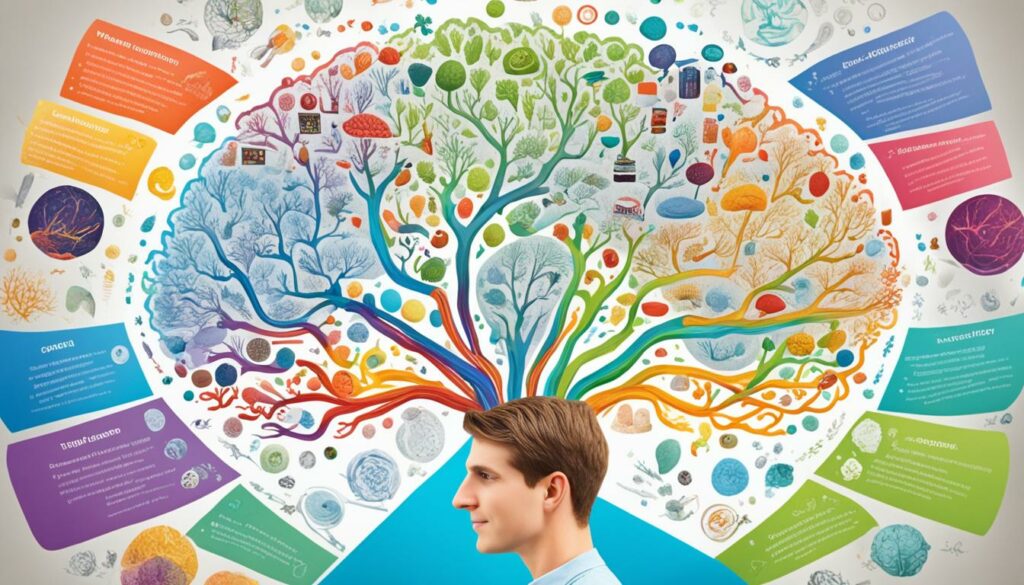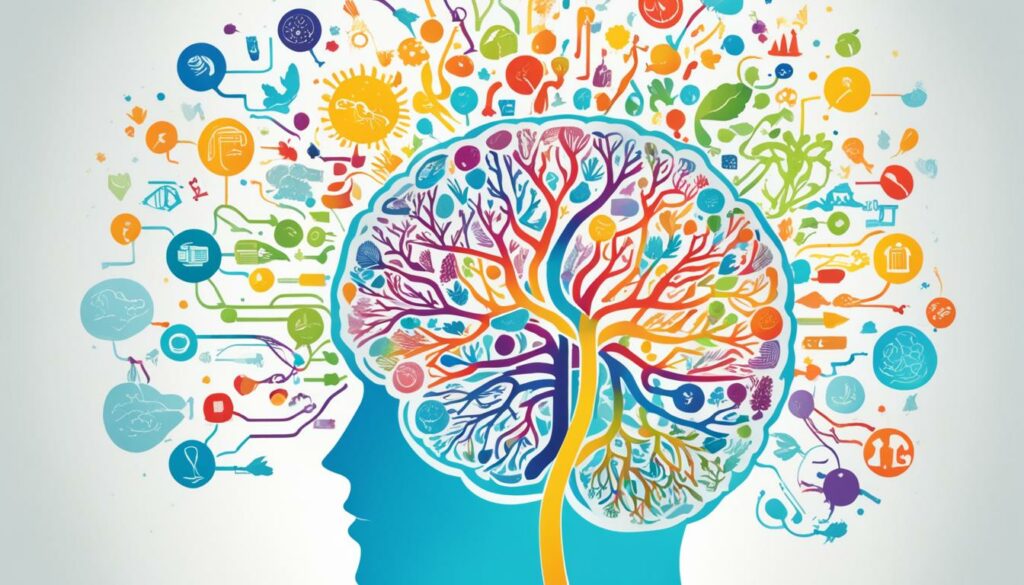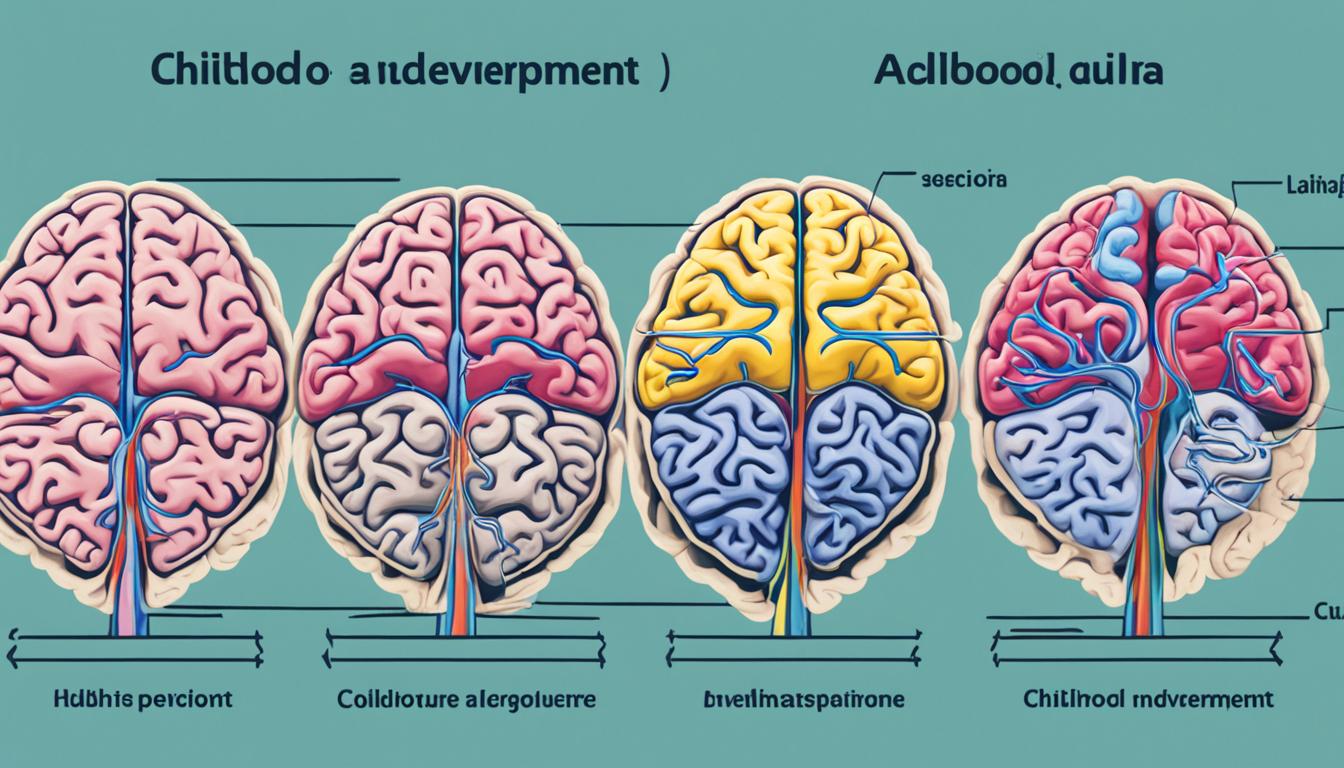Brain Development: Which Part Matures Last?
Brain development during childhood and adolescence is a fascinating journey that involves the maturation of different regions of the brain. Have you ever wondered which part of the brain develops last? In this article, we will explore the stages of brain development, with a focus on the final stage of maturation.
Several studies, including those by Giedd et al. (1999) and Sowell et al. (1999, 2001), have found that the frontal and striatal regions of the brain develop last. These areas are responsible for functions such as decision-making, judgment, and impulse control. It is interesting to note that the prefrontal cortex, a crucial component of the frontal region, continues to develop until around the age of 25.
During this final stage of brain development, the connections between the emotional part of the brain (the amygdala) and the decision-making center are still developing in teenagers. This can contribute to impulsive behavior during adolescence.
Understanding the timeline of brain maturation is important for parents, educators, and healthcare professionals to comprehend the development and behavior of children and adolescents. By gaining insights into the last stage of brain development, we can better support youth during their critical maturing years.
- The frontal and striatal regions of the brain develop last in children and adolescents.
- The prefrontal cortex, responsible for decision-making, continues to develop until around the age of 25.
- The connections between the emotional part of the brain and the decision-making center are still developing during the teenage years, contributing to impulsive behavior.
- Understanding the timeline of brain maturation is essential for supporting the healthy development of children and adolescents.
- Awareness of the last stage of brain development helps promote responsible decision-making and behavior in young individuals.
Brain Development During Adolescence

Adolescence is a critical period for brain development, as it is characterized by significant changes in both structure and function. During this stage, the brain undergoes a process called myelinogenesis, which is essential for efficient neurocircuitry and the transmission of nerve impulses.
Studies have shown that the maturation of the adolescent brain is influenced by various factors, including heredity, environment, and sex hormones. Hormones like estrogen, progesterone, and testosterone play a crucial role in shaping brain development during this period.
One key aspect of adolescent brain development is the ongoing development of the connections between the emotional part of the brain, known as the amygdala, and the decision-making center. These connections are still developing, which can result in impulsive behavior during adolescence.
Another area of the brain that undergoes significant changes during adolescence is the prefrontal cortex, which is responsible for rational thinking, decision-making, and impulse control. These changes in the prefrontal cortex contribute to the gradual development of these crucial cognitive processes.
Understanding brain development during adolescence is essential for parents, educators, and healthcare professionals in providing appropriate support and guidance to teenagers. By recognizing the unique characteristics of adolescent brain maturation, we can better address their needs and help promote healthy cognitive and emotional development.
Factors Influencing Adolescent Brain Maturation
Brain maturation during adolescence is a complex process that is influenced by various factors. Understanding these factors is crucial for promoting healthy brain development in adolescents.
Heredity and Environment
Heredity and environment both play significant roles in shaping adolescent brain development. While genetics provide the blueprint for brain maturation, the environment can either support or hinder this process. Factors such as socio-economic status, educational opportunities, and the presence of nurturing relationships can impact brain development.
Prenatal and Postnatal Insult
Both prenatal and postnatal insults can have an impact on adolescent brain maturation. Prenatal insult refers to any harm or disturbance that occurs during pregnancy, such as exposure to toxins, maternal stress, or maternal substance abuse. Postnatal insult refers to any adverse events or conditions that occur after birth, such as trauma, neglect, or exposure to violence.
Sex Hormones
Sex hormones, including estrogen, progesterone, and testosterone, play a crucial role in adolescent brain maturation. These hormones influence the development and organization of neural circuits, particularly in areas related to emotion regulation and social behavior.
Environmental Neurotoxins
Exposure to environmental neurotoxins can have detrimental effects on the maturation of the adolescent brain. Neurotoxins, such as lead, mercury, and certain pesticides, can interfere with neural processes and disrupt normal brain development.
Drug Abuse
Drug abuse, including the use of cigarettes, caffeine, alcohol, and illicit substances, can significantly impact brain development during adolescence. Substance abuse can alter neural pathways, impair cognitive function, and increase the risk of mental health disorders.
Nutritional Status
Nutritional status plays a critical role in adolescent brain maturation. Adequate intake of essential nutrients, vitamins, and minerals is necessary for optimal brain function and development. Poor nutrition can impair cognitive abilities and contribute to learning difficulties.
Sleep Patterns
Sleep patterns have a profound impact on adolescent brain maturation. Sufficient and quality sleep is crucial for neural consolidation, memory formation, and overall brain health. Disrupted sleep patterns, such as insufficient sleep or inconsistent sleep schedules, can negatively affect cognitive function and mental well-being.
Understanding and addressing these factors is essential for promoting healthy brain development in adolescents. By creating an environment that supports optimal brain maturation, we can help teenagers thrive and reach their full potential.
Plasticity and Impulsivity in the Adolescent Brain

The adolescent brain is a remarkable organ that exhibits significant plasticity, allowing for the acquisition of new skills and the formation of synaptic connections. This plasticity, however, can also contribute to impulsive behavior in teenagers.
During adolescence, the connections between the emotional part of the brain and the decision-making center are still developing. This means that adolescents rely more heavily on emotional input rather than rational thinking when making decisions. As a result, impulsive decision-making and a focus on immediate gratification often take precedence over considering long-term consequences.
Understanding the interplay between plasticity and impulsivity is crucial for comprehending adolescent behavior and promoting healthy decision-making. By recognizing the ongoing development of synaptic circuitry and the impact of emotional input on decision-making, parents, educators, and caregivers can provide the necessary guidance and support to help teenagers navigate this crucial stage of life.
“The adolescent brain is like a work in progress, with its synaptic circuitry constantly shaping and reshaping. This plasticity allows for the formation of new connections and the integration of experiences, but it also makes adolescents more susceptible to impulsive behavior.”
Impulsivity and Decision-Making
Impulsivity is a common characteristic of adolescence, driven by the ongoing development of the brain’s synaptic circuitry. The emotional part of the brain, including the amygdala, plays a significant role in impulsivity, while the rational part of the brain, such as the prefrontal cortex, is still maturing.
This imbalance between emotional input and rational thinking can lead to impulsive decision-making, where immediate desires and emotions take precedence over careful consideration of the long-term consequences. Teenagers may engage in risky behaviors, such as substance abuse, reckless driving, or engaging in unsafe relationships, due to the heightened influence of emotions on their decision-making process.
“Adolescence is a challenging time when impulsive decisions can have lasting consequences. Understanding the factors that contribute to impulsivity and the development of decision-making skills is crucial for guiding teenagers towards responsible behavior.”
Supporting Healthy Decision-Making
To promote healthy decision-making in adolescents, it is essential to provide them with guidance and support. Creating an environment that fosters open communication and trust allows teenagers to express their emotions and concerns without fear of judgment. An emphasis on developing decision-making skills, such as considering alternatives, weighing risks and benefits, and considering long-term outcomes, can also help adolescents navigate impulsivity more effectively.
By recognizing the plasticity of the adolescent brain and understanding the role of emotional input in decision-making, parents and caregivers can play a vital role in helping teenagers make more informed choices. Encouraging self-reflection, empathy, and resilience can further support the development of responsible decision-making skills in adolescents.
Ultimately, the interplay between plasticity and impulsivity in the adolescent brain highlights the importance of fostering a supportive and understanding environment. By equipping teenagers with the skills and knowledge needed to navigate impulsivity, we can empower them to make healthier decisions and set a strong foundation for their future.
Parental Role in Supporting Adolescent Brain Development

Parents play a vital role in supporting the development of the adolescent brain. The parent-child relationship has a profound impact on shaping the cognitive and emotional well-being of teenagers. By actively engaging with their children, parents can model positive behavior and guide them towards responsible decision-making.
One effective way parents can support healthy brain development is by modeling desirable behavior themselves. Adolescents observe and learn from the actions of their parents, so demonstrating responsible behavior, empathy, and good decision-making can positively influence their own choices.
“Parents are the ultimate role models for children. Every word, movement, and action has an effect. No other person or outside force has a greater influence on a child than the parent.” – Bob Keeshan
Discussing the consequences of actions is another crucial aspect of parental guidance. By helping teenagers understand the potential outcomes of impulsive decisions and actions, parents can encourage critical thinking and promote better decision-making skills.
Creating an environment of emotional safety is equally important. Adolescents need to feel comfortable approaching their parents with their problems, concerns, or questions. By fostering open communication, non-judgmental support, and trust, parents can establish emotional safety, allowing teenagers to seek guidance when needed.
The Importance of a Strong Parent-Child Relationship
A strong parent-child relationship forms the foundation for healthy brain development during adolescence. When parents actively engage with their children, it enhances their emotional well-being and cognitive growth. This bond provides a sense of belonging and security, enabling teenagers to navigate the challenges of adolescence more effectively.
By building a strong parent-child relationship, parents can create a safe and supportive space for their teenagers. This environment promotes open communication, empathy, and a deep understanding of the adolescent’s unique experiences.
Supporting Emotional Safety for Adolescent Brain Development
Emotional safety is crucial for optimal brain development in adolescents. It involves creating a non-judgmental atmosphere where teenagers feel comfortable expressing their emotions and seeking guidance. By acknowledging their feelings, validating their experiences, and offering empathy, parents can promote emotional safety and foster healthy brain development in their children.
Investing time in activities that nurture the parent-child bond is one way to support emotional safety. This can include participating in shared hobbies, engaging in meaningful conversations, or simply spending quality time together. These interactions create opportunities for parents to demonstrate their unconditional love and reinforce their commitment to their children’s well-being.
Remember, promoting healthy brain development in adolescents requires a combination of providing guidance, modeling behavior, and creating emotional safety. As parents play an integral role in shaping their children’s lives, the choices they make today can have a lasting impact on their child’s brain development and overall well-being.
| Parental Role in Supporting Adolescent Brain Development | Key Elements |
|---|---|
| Modeling Behavior | Parents can influence their teenagers by demonstrating responsible behavior and good decision-making. |
| Consequences of Actions | Discussing the potential outcomes of impulsive decisions helps teenagers understand the importance of critical thinking. |
| Emotional Safety | Creating a safe and non-judgmental environment encourages open communication and trust. |
| Strong Parent-Child Relationship | A deep and supportive bond fosters emotional well-being and cognitive growth in adolescents. |
By embracing their essential role in shaping adolescent brain development, parents can empower their children to navigate the challenges of adolescence and thrive into adulthood.
Supporting Adolescent Brain Development through Understanding

Understanding adolescent brain development is crucial in promoting healthy maturation and overall well-being in teenagers. By gaining insight into the unique characteristics of the adolescent brain, we can provide the support and guidance needed for optimal development. Here are some key factors to consider:
Fostering Resilience and Competence
Adolescence is a period of significant growth and change, both physically and emotionally. Reminding teens that they possess resilience and competency can empower them to navigate challenges and make better decisions. Encouraging a growth mindset and emphasizing their strengths can help build their self-esteem and resilience.
The Role of Sex Hormones
Sex hormones, such as estrogen, progesterone, and testosterone, play a crucial role in brain development during adolescence. These hormones influence the development of neural pathways and contribute to the maturation of the brain. Recognizing the influence of sex hormones allows us to better understand the physical and emotional changes experienced during this stage of life.
The Importance of Sleep Habits
Adequate sleep is essential for adolescent brain development. Research has shown that sleep directly impacts cognitive function and emotional regulation. Encouraging good sleep habits, such as establishing a consistent sleep schedule and creating a sleep-friendly environment, can support optimal brain development in teenagers.
Show Interest in Their Activities
Being genuinely interested and involved in adolescents’ activities can make them feel valued and supported. By actively engaging in conversations about their hobbies, interests, and aspirations, we show them that their passions matter. This involvement fosters a sense of connection and belonging, which is crucial for healthy brain development.
Understanding the intricacies of adolescent brain development allows us to provide the necessary support and guidance for teenagers. By fostering resilience, recognizing the role of sex hormones, promoting good sleep habits, and showing genuine interest in their activities, we can help ensure that adolescents thrive both cognitively and emotionally.
Recognizing Signs of Trouble in Adolescent Brain Development
During adolescence, it is normal for teenagers to experience ups and downs as they navigate the challenges of growing up. However, significant and prolonged mood or behavioral changes could indicate underlying issues in brain development. It is crucial for parents and caregivers to be vigilant and recognize these signs to provide the necessary support and intervention. Mental health issues, such as depression, can arise during the teenage years and should be addressed promptly to prevent further complications.
Mood and Behavioral Changes: Adolescents may exhibit sudden and extreme mood swings, irritability, persistent sadness, difficulty concentrating, and changes in sleep or appetite. These noticeable shifts in behavior and emotions can indicate underlying problems in brain development.
Mental Health Issues: Depression, anxiety, and other mental health disorders can emerge during adolescence. These conditions can significantly impact brain development and overall well-being if left unaddressed. It is important for parents and caregivers to be aware of the symptoms and seek professional help if necessary.
Identifying signs of trouble in brain development early on can help ensure that adolescents receive the support they need for healthy emotional and cognitive development. If you notice worrisome changes in your teenager’s mood, behavior, or mental health, it is essential to consult with a healthcare professional or mental health specialist for a proper evaluation and intervention.
Guiding Adolescents Towards Independence
As adolescents continue to develop their brains, it is essential for parents and caregivers to guide them towards independence. This stage of life presents a unique opportunity to support responsible behavior and foster autonomy in teenagers. By doing so, we can help them develop essential decision-making skills that will serve them throughout their lives.
Encouraging responsible behavior is a key aspect of guiding adolescents towards independence. By setting clear expectations and providing positive reinforcement, parents can help adolescents understand the importance of making responsible choices. This includes teaching them about the consequences of their actions and allowing them to experience the outcomes firsthand, whether positive or negative. This hands-on approach enables teenagers to learn from their mistakes and develop a strong sense of accountability.
Creating opportunities for autonomy is another crucial component of guiding adolescents towards independence. By gradually giving teenagers more freedom to make their own decisions, parents can empower them to take ownership of their lives. This might involve allowing them to choose their extracurricular activities, make decisions about their personal style, or take on responsibilities around the house. By respecting their opinions and involving them in the decision-making process, parents can help adolescents build confidence and develop their own identity.
It is important for parents to strike a balance between providing support and allowing adolescents to make their own choices. While it is natural for parents to want to protect their children from making mistakes, it is essential to understand that making mistakes is a valuable part of the learning process. By allowing adolescents to experience the consequences of their decisions, parents can help them develop critical thinking skills and learn to navigate challenges independently.
In summary, guiding adolescents towards independence involves supporting responsible behavior and nurturing their autonomy. By encouraging responsible behavior and providing opportunities for decision-making, parents can help teenagers develop essential skills that will serve them well in adulthood. Striking a balance between support and autonomy is key, as it allows adolescents to learn from their mistakes while still feeling the guidance and care of their parents. Through this approach, parents can play a vital role in shaping adolescents into responsible and capable adults.
| Guiding Adolescents Towards Independence | Supporting Responsible Behavior | Autonomy | Decision-making Skills |
|---|---|---|---|
| Encourage responsible behavior | Provide positive reinforcement | Create opportunities for autonomy | Allow for hands-on decision-making |
| Clear expectations and consequences | Teaching accountability | Respecting opinions | Building critical thinking skills |
| Gradually giving more freedom | Learning from mistakes | Involving in decision-making | Nurturing independent problem-solving |
The Role of Sleep in Brain Development
Sleep plays a crucial role in promoting optimal brain development, especially during adolescence. Research has consistently shown that teenagers need more sleep than adults due to the ongoing changes and development in their brains. Adequate sleep is vital for cognitive functions such as memory consolidation, learning, attention, and problem-solving abilities.
Good sleep habits are essential for supporting healthy brain development in adolescents. Establishing a consistent sleep schedule helps regulate the body’s internal clock and improves overall sleep quality. Creating a sleep-friendly environment, such as a cool, dark, and quiet bedroom, promotes deeper and more restorative sleep. Avoiding electronic devices before bedtime also helps in promoting better sleep.
It is important for parents and caregivers to prioritize the importance of sleep in their teenagers’ lives. Encouraging and supporting good sleep routines can have long-lasting benefits for brain function and overall well-being. By prioritizing adequate sleep, parents are setting their teenagers up for success in school, relationships, and other areas of life.
Getting enough sleep is not only important for brain development but also for emotional regulation and mental health. Poor sleep has been linked to an increased risk of mood disorders, depression, anxiety, and behavioral problems in teenagers. It is crucial for parents and caregivers to emphasize the importance of good sleep and help their teenagers establish healthy sleep habits.
By understanding the role of sleep in brain development and prioritizing good sleep habits, parents and caregivers can support healthy brain maturation in adolescents. Adequate sleep contributes to optimal cognitive function, emotional well-being, and overall growth during this critical stage of life.
Creating Emotional Safety for Adolescent Brain Development
Creating emotional safety is vital for promoting healthy brain development in adolescents. Building an environment of open communication, trust, and non-judgment is essential in fostering emotional well-being and supporting overall growth in teenagers.
Parents and caregivers play a crucial role in providing a safe space for adolescents to express their thoughts, feelings, and challenges. Encouraging open communication allows teenagers to feel heard, understood, and supported. It is important to listen actively and empathetically, without passing judgment or criticism.
A non-judgmental environment encourages teenagers to share their experiences, emotions, and concerns without fear of punishment or rejection. Creating a space where adolescents feel safe to be themselves helps cultivate a sense of belonging and emotional security, which is fundamental for their brain development.
Trust is a fundamental component of emotional safety. Fostering trust involves being reliable, consistent, and respectful in interactions with adolescents. When teenagers feel that their thoughts and emotions are valued and respected, they are more likely to trust their parents and caregivers. Trust empowers them to navigate challenges, seek guidance, and make better decisions.
By prioritizing emotional safety, parents and caregivers provide the necessary foundation for healthy brain development in adolescents. When teenagers feel emotionally secure, they are more likely to engage in positive behaviors and develop essential life skills.
Remember, creating emotional safety involves:
- Promoting open and honest communication
- Creating a non-judgmental and accepting environment
- Building trust through reliability and respect
By implementing these principles, parents and caregivers can support adolescents in their journey towards emotional well-being and healthy brain development.
Conclusion
Understanding brain development during adolescence is crucial for supporting healthy maturation and promoting responsible behavior in teenagers. The adolescent brain is still developing, particularly in areas related to decision-making and impulse control. By recognizing the unique characteristics of brain development in adolescents and providing appropriate support, parents and caregivers can help teenagers navigate this important stage of life and lay the foundation for a successful transition into adulthood.
Supporting healthy brain development in adolescence sets the stage for lifelong well-being and success. It is important to foster an understanding of the changes happening in the adolescent brain and their implications for behavior. By creating a supportive and nurturing environment, parents and caregivers can guide teenagers towards responsible decision-making and help them develop essential life skills.
Understanding the importance of brain development in adolescence also highlights the need for open communication and building trust. By creating emotional safety and providing a non-judgmental space, parents can encourage teenagers to share their thoughts and challenges, fostering a sense of belonging and emotional well-being. This, in turn, supports healthy brain development and overall growth in teenagers.
FAQ
What part of the brain develops last?
Studies have shown that the frontal and striatal regions of the brain develop last. The prefrontal cortex, responsible for judgment and decision-making, continues to develop until around the age of 25.
What are the stages of brain development?
Brain development occurs in different stages, with the frontal and striatal regions maturing last. The prefrontal cortex, responsible for judgment and decision-making, continues to develop until around the age of 25.
What is the last stage of brain development?
The last stage of brain development is the maturation of the frontal and striatal regions, including the prefrontal cortex responsible for judgment and decision-making.
What are the consequences of delayed brain development?
Delayed brain development can impact cognitive abilities, emotional regulation, and decision-making skills. It may contribute to difficulties in academic performance, social interactions, and overall well-being.
Why is brain development delayed in some individuals?
Various factors, such as genetic predisposition, environmental influences, and hormonal imbalances, can contribute to delayed brain development. Additionally, prenatal and postnatal insults, like exposure to neurotoxins or drug abuse, can affect brain maturation.
How does brain growth differ in children compared to adolescents?
Brain growth in children is characterized by rapid synaptic proliferation, while adolescence focuses more on refining neural connections and eliminating unused pathways. This pruning process contributes to the maturation of cognitive and emotional functions.
How does neural development occur in adolescents?
During adolescence, neural development involves myelinogenesis, which is the formation of myelin sheaths around nerve fibers. This process enhances the efficiency of neural communication and enables more complex cognitive processes.
What is the connection between the emotional part of the brain and decision-making?
The connections between the emotional part of the brain (amygdala) and the decision-making center continue to develop in teenagers. This development can lead to impulsive behavior and a greater reliance on emotional input rather than rational thinking.
How can parents support the development of the adolescent brain?
Parents can play a crucial role in supporting adolescent brain development by being positive role models, discussing the consequences of actions, providing emotional support, and fostering a safe and non-judgmental environment for their children.
What factors influence adolescent brain maturation?
Adolescent brain maturation is influenced by factors such as heredity, environment, sex hormones (estrogen, progesterone, and testosterone), neurotoxins, drug abuse, nutritional status, and sleep patterns.
How does plasticity and impulsivity affect the adolescent brain?
The adolescent brain exhibits significant plasticity, allowing for learning and adaptation. However, this plasticity can contribute to impulsivity, as the connections between the emotional part of the brain and the decision-making center are still developing.
What are the signs of trouble in adolescent brain development?
Significant and prolonged mood or behavioral changes can indicate underlying issues in brain development. If parents and caregivers notice these signs, it is important to seek professional help for assessment and support.
How can parents guide adolescents towards independence?
Parents can guide adolescents towards independence by encouraging responsible behavior, providing opportunities for autonomy, and striking a balance between support and allowing them to make their own choices and experience the consequences.
Why is sleep important for brain development in adolescents?
Adequate sleep is crucial for optimal brain development in adolescents. Research has shown that teenagers need more sleep than adults due to ongoing changes in their brains. Good sleep habits support healthy brain function and overall well-being.
How can emotional safety support adolescent brain development?
Creating emotional safety through open communication, a non-judgmental environment, and building trust is essential for supporting healthy brain development in adolescents. It fosters a sense of belonging and emotional well-being, allowing for optimal growth.
Why is it important to understand brain development during adolescence?
Understanding brain development during adolescence is crucial for supporting healthy maturation, promoting responsible behavior, and providing appropriate support for teenagers. It sets the stage for lifelong well-being and success.







